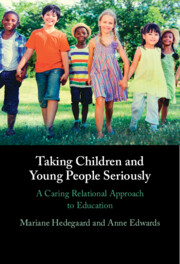Book contents
- Taking Children and Young People Seriously
- Taking Children and Young People Seriously
- Copyright page
- Contents
- Figures
- Tables
- Chapter 1 Taking Children and Young People Seriously
- Chapter 2 A Cultural-Historical Approach to Children’s Development and Childhood
- Chapter 3 Working Relationally with Other Professionals and Families
- Chapter 4 Very Young Children
- Chapter 5 Care and Education in Kindergarten with Play as the Core Activity
- Chapter 6 Engaging with Knowledge When Starting School
- Chapter 7 Caring Approaches to Pedagogy
- Chapter 8 The Primary School Age
- Chapter 9 Developmental Teaching as a Double Move between Subject Knowledge and Children’s Appropriation of Personal Knowledge
- Chapter 10 Adolescence and Transitions into Early Adulthood
- Chapter 11 A Caring Relational Approach to Education
- References
- Index
Chapter 8 - The Primary School Age
Enabling the Agentic Learner
Published online by Cambridge University Press: 08 June 2023
- Taking Children and Young People Seriously
- Taking Children and Young People Seriously
- Copyright page
- Contents
- Figures
- Tables
- Chapter 1 Taking Children and Young People Seriously
- Chapter 2 A Cultural-Historical Approach to Children’s Development and Childhood
- Chapter 3 Working Relationally with Other Professionals and Families
- Chapter 4 Very Young Children
- Chapter 5 Care and Education in Kindergarten with Play as the Core Activity
- Chapter 6 Engaging with Knowledge When Starting School
- Chapter 7 Caring Approaches to Pedagogy
- Chapter 8 The Primary School Age
- Chapter 9 Developmental Teaching as a Double Move between Subject Knowledge and Children’s Appropriation of Personal Knowledge
- Chapter 10 Adolescence and Transitions into Early Adulthood
- Chapter 11 A Caring Relational Approach to Education
- References
- Index
Summary
In this chapter, we draw on the cultural-historical ideas explained in Chapter 7 and Vygotsky’s work on crises and turning points in development to discuss primary and middle school-age children and how they can be supported as agentic learners taking forward their social situations of development. Support and challenge come through how environments are structured and through interactions and relationships, which involve family members, teachers and the other professionals. Key to becoming agentic learners is children’s use of cognitive tools such as literacy and numeracy, which enable them to engage with the knowledge that is valued in society and address the challenges presented to them. We explain that supporting the competent use of these tools involves taking the child’s perspective to understand their motive orientation and giving care-full relational guidance that demystifies the demands on them. We consider how digital tools and processes such as Assessment for Learning can develop learner agency. We introduce Hedegaard’s work on the double move in pedagogy and the Radical-Local initiative, which builds on Davydov’s work. Both are elaborated in Chapter 9. We conclude by discussing a cultural-historical account of resilience, which focuses on enhancing children’s agency and its importance for social inclusion.
Keywords
- Type
- Chapter
- Information
- Taking Children and Young People SeriouslyA Caring Relational Approach to Education, pp. 170 - 201Publisher: Cambridge University PressPrint publication year: 2023

